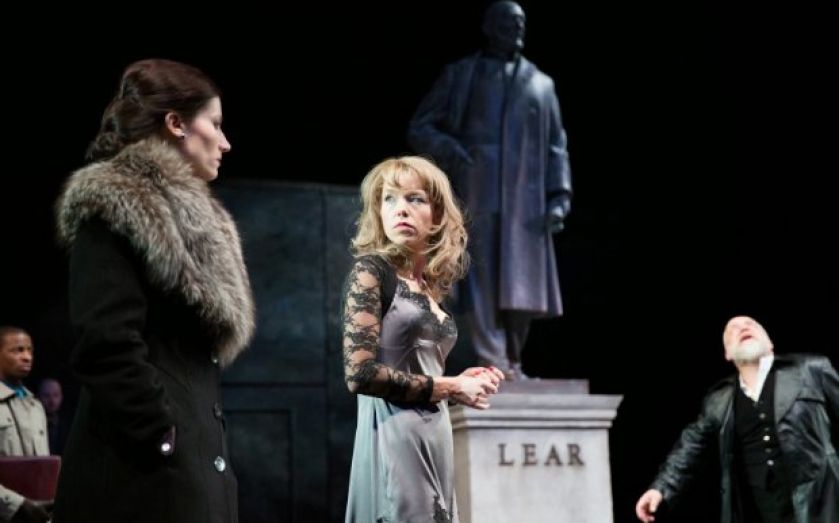Review: King Lear

Sam Mendes’ recent musical production of Charlie and the Chocolate Factory only really gathered pace after the interval. It was as if the director couldn’t be bothered with all the establishing stuff and was just waiting to get inside the wacky psychedelic funhouse that is Wonka’s factory, with all its potential for spectacular set pieces and goofy visual gags.
Rushing through to the good bits is all very well when your source material is a musical adaptation of Charlie and the Chocolate Factory, but King Lear overflows with first-class lines deserving the extra leg-room. Mendes’ King Lear is a visual triumph with a sprawling cast of impeccably choreographed extras and impressive stage mechanics, but some of the quieter moments are engulfed by the sheer volume (in both senses of the word) of things going on around them.
Set in a Soviet-style totalitarian regime, his production is militaristic and masculine; strong on strength, weak on tenderness. The play’s famed moments of brutality – Lear on the Heath beneath the thundering storm, the plucking out of Gloucester’s eyes – are done with slick visual panache. The words themselves, however, often feel secondary to the action. The removal of Gloucester’s eyes is achieved with through a clever sleight of hand, but the accompanying line “out vile jelly” – one to savour, surely – escapes almost undetected.
The priority of spectacle over language extends to Simon Russell Beale, who gives a fretful, physically engaging performance as Lear. Short and stout with a shaven head, he’s like an extravagantly bearded baby, which heightens the drama of his exposure beneath the storm. However, he whistles through some of the main soliloquies, ranting and raving to good effect but failing to capture the sad poetry of Lear’s senility.
This softer side of the king is in evidence during the heartbreaking final acts in which a repentant Lear is reunited with a divinely forgiving Cordelia. When they’re sent to prison, Lear consoles his daughter with the image of them “singing together like birds in the cage” – a touching moment that needs and deserves breathing space it doesn’t receive.
There are, however, elements of King Lear that suit a more rip-roaring approach. The lascivious humour, for example, is served up hot and steaming. Following a hungry and illicit kiss with Edmund, Kate Fleetwood’s Goneril lashes out the line “oh the difference of man and man,” her tongue like a dominatrix’s whip.
Hammier moments like these provide relief from the sprawling vastness of the production. Such vastness may be a result of Mendes’ reluctance to wield an editorial axe. Sections are added in – Gloucester is water-boarded, Lear kills the fool – but little is left out from the original text. The result is a strange combination of feeling both hurried and drawn out. It’s by no means a failure, but given the success of Beale and Mendes’ previous collaborations, it is a disappointment.
